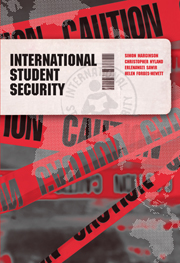Book contents
- Frontmatter
- Contents
- List of figures
- List of tables
- About the authors
- Preface
- PART 1 Students in the global market
- PART 2 Security in the formal and public domain
- 5 Finances
- 6 Work
- 7 Housing
- 8 Health
- 9 Safety of the person
- 10 The immigration department
- PART 3 Security in the informal and private domain
- PART 4 Protection and empowerment
- References
- Index
10 - The immigration department
Published online by Cambridge University Press: 05 August 2012
- Frontmatter
- Contents
- List of figures
- List of tables
- About the authors
- Preface
- PART 1 Students in the global market
- PART 2 Security in the formal and public domain
- 5 Finances
- 6 Work
- 7 Housing
- 8 Health
- 9 Safety of the person
- 10 The immigration department
- PART 3 Security in the informal and private domain
- PART 4 Protection and empowerment
- References
- Index
Summary
Dealing with immigration is pretty hard. Extending a visa, it was a big process. It's not easy. You go to the counter there and pick up this ticket number and you have to wait for ages. And people there are not friendly. They never smile, as if we are thieves or have a criminal offence. You go there, you're really tense and nervous. You can't be yourself.
~ male, 27, computing, Sri LankaINTRODUCTION: THE ALIENS HAVE LANDED
The relationship between mobile non-citizen students and the nation-state in the country of education is inherently ambiguous and problematic.
We live in a zero sum world in which each nation claims sovereignty over a parcel of territory and each fosters a citizenry, people inherited and chosen, towards whom it exercises jurisdiction and responsibility. Each polices borders that are not just geographic but also imagined boundaries vectored by law, politics and culture. So where do resident non-citizens fit? As discussed in chapter 4 international students have left their nation of citizenship but have not become full members of the nation of education. While the original nation can be reached via communications and the diplomatic mission, those ties have thinned. That nation no longer nurtures and regulates them in a day to day sense. But there is no global state mapped on the growing population of the globally mobile. In a real sense international students find themselves in limbo, people without a state.
- Type
- Chapter
- Information
- International Student Security , pp. 241 - 262Publisher: Cambridge University PressPrint publication year: 2010



